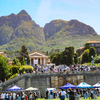UCT’s approach to emergency remote teaching and learning
12 August 2020 | Story Niémah Davids. Photo Adobe Stock. Read time 5 min.
Introducing emergency remote teaching and learning at the University of Cape Town (UCT) amid the global COVID-19 pandemic has been a multipronged, cross-disciplinary process that has required agility and collective buy-in from role players across the university.
Formal remote teaching kicked off on 28 April and UCT’s Centre for Innovation in Learning and Teaching (CILT), based at the Centre for Higher Education Development (CHED), has played an integral part in ensuring this temporary learning methodology is effectively enabled and runs according to plan.
Laura Czerniewicz, the director of CILT, and Sukaina Walji, the acting deputy director, unpacked the university’s emergency remote teaching and learning plan, the strategies that are in place and some of the stumbling blocks.
“The move to remote teaching was unusually rapid. There was no time for the usual deliberate course design or online teaching strategies,” said Czerniewicz.
When President Cyril Ramaphosa announced in mid-March that the country would enter lockdown Level 5, he also called for the immediate and indefinite shutdown of university residences. Czerniewicz said her department needed to shift gear completely. It was critical to support academics and course convenors to develop course material fit for remote teaching in order for students to continue the academic programme from their homes.
“We knew that the type of [online] learning would need to take into account the contexts of our students.”
“We knew that the type of [online] learning would need to take into account the contexts of our students and we advocated for low-tech remote teaching,” Walji added.
Low-tech remote teaching uses technical teaching strategies that promote asynchronous learning and allow learning to take place in different environments using little bandwidth.
Tech innovations in place
The department successfully enhanced Vula, the university’s online collaboration and learning system, for the second semester to include several engaging features:
- a new tool, similar to a Facebook wall, for posts and updates
- redesigned text editor content templates, which boast speech bubbles and idea icons
- a simple assignment grading tool, which includes a student progress bar
- rubric grading to integrate assignments, tests and quizzes in a single gradebook
- a template that enables easy course set-up and design using 2020 course site and page templates.
Prior enhancements include Zoom video conferencing and improved learning analytics.
Strategies to support academics
CILT has taken a “multipronged” approach to supporting academics, and it continues to evolve. The team developed the Design Studio short course, a four-week programme tailored towards academics and course convenors at UCT. It provides a “rapid design space” that offers academics tips on how to restructure or redevelop course material fit for remote learning using a “structured approach”.
The course offers live check-in and discussion sessions that provide reviews and instant feedback. To date, more than 250 academics have signed up and participated in this short course.
Further, the team also devised a course design checklist, which highlights the areas convenors need to “pay attention” to, based on students’ interactions and responses, as well as resource guidelines, weekly webinars and regular hands-on consultations.
“Teaching and learning remotely happened [as a result of] hard work from everyone across the university, by working together crossing traditional boundaries and silos during what was often a contested discourse,” said Walji.
The drawbacks
Conceptualising and developing this integrated learning methodology required assistance from different functions across the university, including UCT Libraries, the Student Wellness Service and the Disability Service, all of which have played critical roles in this process.
In some areas the remote teaching and learning experience can be enhanced. Such strategies are constantly being reviewed and include improving the quality of course material, restructuring the course site and introducing a better support system for students’ tutorials, discussions and assessments.
Studying online means students need to implement their own time management strategies to keep track of their coursework. In addition to this, students have had to face many common challenges, which include feeling “disconnected” from peers and experiencing network connectivity problems.
Recalibrating the course workload has also been “particularly challenging” and a steep learning curve for academics. The lessons learnt during this process are being drawn on to implement changes in the second semester and beyond.
Beyond COVID-19
While challenging in many respects, emergency remote teaching during the COVID-19 pandemic has catalysed creative and innovative thinking. It has also provided a vantage point from which to reflect on and review this new learning methodology in comparison to traditional learning for the coming post-COVID-19 world.
In recent weeks, the department has facilitated “fruitful” discussions on alternative (online) assessment techniques for beyond the pandemic.
“It is likely that there will be more digitally mediated learning as academics have experimented with different tools and experienced a range of learning strategies made possible through the online environment,” Walji said.
“This may well lead to new forms of blended learning in the future.”
 This work is licensed under a Creative Commons Attribution-NoDerivatives 4.0 International License.
This work is licensed under a Creative Commons Attribution-NoDerivatives 4.0 International License.
Please view the republishing articles page for more information.
UCT’s response to COVID-19
COVID-19 is a global pandemic that caused President Cyril Ramaphosa to declare a national disaster in South Africa on 15 March 2020 and to implement a national lockdown from 26 March 2020. UCT is taking the threat of infection in our university community extremely seriously, and this page will be updated with the latest COVID-19 information. Please note that the information on this page is subject to change depending on current lockdown regulations.
Minister of Health, Dr Joe Phaahla, has in June 2022 repealed some of South Africa’s remaining COVID-19 regulations: namely, sections 16A, 16B and 16C of the Regulations Relating to the Surveillance and the Control of Notifiable Medical Conditions under the National Health Act. We are now no longer required to wear masks or limit gatherings. Venue restrictions and checks for travellers coming into South Africa have now also been removed.
Read the latest document available on the UCT policies web page.
Campus communications
2022
UCT Community of Hope Vaccination Centre
On Wednesday, 20 July, staff from the University of Cape Town’s (UCT) Faculty of Health Sciences came together with representatives from the Western Cape Government at the UCT Community of Hope Vaccination Centre at Forest Hill Residence to acknowledge the centre’s significance in the fight against COVID-19 and to thank its staff for their contributions. The centre opened on 1 September 2021 with the aim of providing quality vaccination services to UCT staff, students and the nearby communities, as well as to create an opportunity for medical students from the Faculty of Health Sciences to gain practical public health skills. The vaccination centre ceased operations on Friday, 29 July 2022.
With the closure of the UCT Community of Hope Vaccination Centre, if you still require access to a COVID-19 vaccination site please visit the CovidComms SA website to find an alternative.
“After almost a year of operation, the University of Cape Town’s (UCT) Community of Hope Vaccination Centre, located at the Forest Hill residence complex in Mowbray, will close on Friday, 29 July 2022. I am extremely grateful and proud of all staff, students and everyone involved in this important project.”
– Vice-Chancellor Prof Mamokgethi PhakengWith the closure of the UCT Community of Hope Vaccination Centre, if you still require access to a COVID-19 vaccination site please visit the CovidComms SA website to find an alternative.
Frequently asked questions
Global Citizen Asks: Are COVID-19 Vaccines Safe & Effective?
UCT’s Institute of Infectious Disease and Molecular Medicine (IDM) collaborated with Global Citizen, speaking to trusted experts to dispel vaccine misinformation.
If you have further questions about the COVID-19 vaccine check out the FAQ produced by the Desmond Tutu Health Foundation (DTHF). The DTHF has developed a dedicated chat function where you can ask your vaccine-related questions on the bottom right hand corner of the website.
IDM YouTube channel | IDM website
“As a contact university, we look forward to readjusting our undergraduate and postgraduate programmes in 2023 as the COVID-19 regulations have been repealed.”
– Prof Harsha Kathard, Acting Deputy Vice-Chancellor: Teaching and Learning
We are continuing to monitor the situation and we will be updating the UCT community regularly – as and when there are further updates. If you are concerned or need more information, students can contact the Student Wellness Service on 021 650 5620 or 021 650 1271 (after hours), while staff can contact 021 650 5685.




















